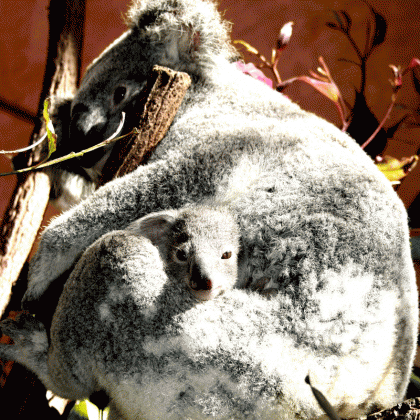Koalas may be good model for understanding human STI

Koala studies may provide important new insights into how chlamydial infections compromise human male infertility, according to new Australian research.
University of Queensland School of Agriculture and Food Sciences' Associate Professor Stephen Johnston is working with QUT Institute of Health and Biomedical Innovation's Professor Ken Beagley to investigate the effects of chlamydial infection on male fertility in both animal models and human males.
Dr Johnston said chlamydia was a commonly sexually transmitted disease in humans.
"Chlamydial infections are also a major cause of poor health and death in koalas in South East Queensland and Northern New South Wales," he said.
"In koalas, infections are typically associated with conjunctivitis (blindness) and infertility in female animals. Just like human infections, they are considered to be predominantly a female problem.
"However, we have recently found many male koalas are positive for chlamydia, and chlamydia can be isolated from many parts of the male reproductive tract including the testis – where sperm is produced.
"Semen collected from these animals is also positive for chlamydia in many cases.
"While there has been a lot of work investigating chlamydia in female koalas, studies on the incidence, detection and severity of the organism in male koalas has previously been very limited."
Dr Johnston said similar to findings in humans, sperm from infected male koalas also appeared to show signs of DNA fragmentation.
This was likely to compromise fertility following either natural mating or the use of banked sperm for artificial insemination.
Professor Beagley said the effects of ascending chlamydial infections in human males on sperm development and fertility are poorly understood.
"Damage to sperm DNA has certainly been demonstrated in males with chlamydial infections and a history chlamydial infections is associated with reduced fertility," he said.
Dr Johnston said the team was exploring methods to establish "clean -up" technologies to screen and remove the disease from semen of infected koala males.
"The sperm then has the potential to be used in artificial insemination programs such as live genome banks, to recover genetics from animals that might otherwise be lost to the general koala population," he said.
"Our group is exploring the effectiveness of antibiotic therapy and developed vaccines for treating male koalas infected with chlamydia.
"The effect of these vaccines on chlamydial infection of the male koala reproductive tract and subsequent sperm quality is being investigated as an alternative to antibiotic treatment."
Dr Johnston said a multidisciplinary approach to studying the effects of chlamydial infection on fertility in male koalas was required to protect the future of this iconic native marsupial.
"Chlamydial infections in male koalas might also be good models for male infertility in livestock species such as pigs and cattle," he said.

















